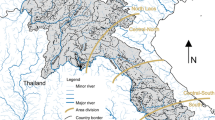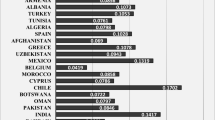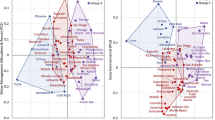Abstract
In this paper, principal components methodology is used to derive simplified and cost effective indexes of water poverty. Using a well known data set for 147 countries from which an earlier five-component water poverty index comprising of Resources, Access, Capacity, Use and Environment was constructed, we find that a simplified three-component composite index comprising of Access, Capacity, and Environment, with unequal weights, or its two-component counterpart comprising of Capacity and Environment with equal weights, would be more cost-effective to construct without much loss of information. These simplified indexes have high positive and negative correlations with the Human Development Index and the Human Poverty Index, respectively.
Similar content being viewed by others
References
Dunteman, G. H. (1989). Principal components analysis. Newbury Park, CA: Sage.
Feitelson, E., & Chenoweth, J. (2002). Water poverty: Towards a meaningful indicator. Water Policy, 4, 263–281.
Field, A. (2000). Discovering statistics using SPSS for windows. London, Thousand Oaks, New Delhi: Sage.
Hair, J. F., Black, B., Babin, B., Anderson, R. E., & Tatham, R. L. (2006). Multivariate data analysis (6th ed.). Upper Saddle River, NJ: Pearson/Prentice Hall.
Heidecke, C. (2006). Development and evaluation of a regional water poverty index for Benin. EPT Discussion Paper 145, Environment and Production Technology Division, International Food Policy Research Institute, January. http://www.ifpri.org/divs/EPTD/DP/papers/eptdp145.pdf
Hicks, N., & Streeten, P. (1979). Indicators of development: The search for a basic needs yardstick. World Development, 7, 567–580.
Jolliffee, I. T. (1972). Discarding variables in a principal component analysis I: Artificial data. Applied Statistics, 21, 160–173.
Jolliffee, I. T. (1973). Discarding variables in a principal component analysis II: Real data. Applied Statistics, 22, 21–31.
Komnenic, V., Ahlers, R., & van der Zaag, P. (2009). Assessing the usefulness of the water poverty index by applying it to a special case: Can one be water poor with high levels of access? Physics and Chemistry of the Earth, 34, 219–224.
Lawrence, P., Meigh, J., & Sullivan, C. (2002). The water poverty index: An international comparison. Keele Economics Research Papers, 2002/19. Revised March 2003. http://www.keele.ac.uk/depts/ec/cer/pubs_kerps.htm
Molle, F., & Mollinga, P. (2003). Water poverty indicators: Conceptual problems and policy issues. Water Policy, 5, 529–544.
Morrison, D. F. (1967). Multivariate statistical methods. New York, NY: McGraw-Hill.
Streeten, P. (1979). From growth to basic needs. Finance and Development, 16, 28–31.
Sullivan, C. (2002). Calculating a water poverty index. World Development, 30, 1195–1210.
Sullivan, C., & Meigh, J. (2003). Considering the water poverty index in the context of poverty alleviation. Water Policy, 5, 513–528.
Sullivan, C. A., & Meigh, J. (2007). Integration of the biophysical and social sciences using an indicator approach: Addressing water problems at different scales. Water Resources Management, 21, 111–128.
Sullivan, C. A., Meigh, J. R., Giacomello, T., Fediw, T., Lawrence, P., Samad, M., et al. (2003). The water poverty index: Development and application at the community scale. Natural Resources Forum, 27, 189–199.
Sullivan, C. A., Meigh, J., & Lawrence, P. (2006). Application of the water poverty index at different scales: A cautionary tale. Water International, 31, 412–426.
United Nations Development Program (UNDP). (2004). Human development report 2004: Cultural liberty in today’s diverse world. New York: United Nations Development Program. http://hdr.undp.org/en/reports/global/hdr2004/ISBN0-19-522146-x
United Nations Development Program (UNDP). (2006). Human development report 2006: Beyond scarcity: Power, poverty and the global water crisis. New York: United Nations Development Program. http://hdr.undp.org/en/reports/global/hdr2006/ISBN0-230-50058-7
United Nations Educational, Scientific, and Cultural Organization (UNESCO)–United Nations World Water Assessment Programme (WWAP). (2006), The 2nd United Nations world water development report: Water a shared responsibility, UNESCO and Berghahn Books, New York. http://www.unesco.org/water/wwap/wwdr2/index.shtml/ISBNUNESCO:92-3-104006-5
Van Koppen, B., Giordano, M., & Butterworth, J. (2007). Community-based water law and water resource management reform in developing countries. Comprehensive assessment of water management in agriculture series (Vol. 5). A New/Forthcoming Book. http://www.cabi.org/bk_BookDisplay.asp?PID=2066. Assessed 10 April 2008
Vishnudas, S., Savenije, H. H. G., Van der Zaag, P. V., Kumar, C. E. A., & Anil, K. R. (2008). Sustainability analysis of two participatory watershed projects in Kerala. Physics and Chemistry of the Earth, 33, 1–12.
Wallace, J. S., Acreman, M. C., & Sullivan, C. A. (2003). The sharing of water between society and ecosystems: from conflict to catchment-based co-management. Philosophical Transactions of the Royal Society of London—Series B Biological Sciences, 358, 2011–2026.
Acknowledgments
The authors wish to thank Joseph Kushner, Caroline Sullivan, Richard Watuwa and anonymous referees for their constructive suggestions. However, the usual disclaimer applies.
Author information
Authors and Affiliations
Corresponding author
Rights and permissions
About this article
Cite this article
Cho, D.I., Ogwang, T. & Opio, C. Simplifying the Water Poverty Index. Soc Indic Res 97, 257–267 (2010). https://doi.org/10.1007/s11205-009-9501-2
Received:
Accepted:
Published:
Issue Date:
DOI: https://doi.org/10.1007/s11205-009-9501-2




